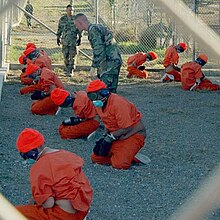UN High Commissioner for Human Rights: close Guantanamo Bay
Sunday, April 7, 2013

Image: Antônio Cruz (Agência Brasil).
Navi Pillay, the United Nations High Commissioner for Human Rights, told the United States Friday to close its prison camp at Guantanamo Bay in Cuba. She argued the continuing indefinite detention without trial violates international law.
"We must be clear about this: the United States is in clear breach not just of its own commitments but also of international laws and standards that it is obliged to uphold", Pillay stated.
Pillay said those held in Guantanamo Bay should face a civilian trial rather than a military tribunal, as the latter "do not meet international fair trial standards". The US has only criminally charged or convicted nine current detainees.

Image: Shane T. McCoy, U.S. Navy.
The Guantanamo Bay camp was opened in January 2002 by former US President George W. Bush and currently holds 166 detainees. As of last month, 31 of the detainees were on hunger strike and eleven were being force fed, according to a US Department of Defense (DoD) spokesperson. Of the hunger strikers, Pillay said: "given the uncertainty and anxieties surrounding their prolonged and apparently indefinite detention in Guantanamo, it is scarcely surprising that people's frustrations boil over and they resort to such desperate measures".
President Barack Obama pledged to close Guantanamo Bay but has thus far failed to do so. The US has cleared transfer of around half of the remaining Guantanamo Bay detainees to their home country or to a third country. Pillay urged those transfers to be acted on: "As a first step, those who have been cleared for release must be released."
Responding to the statement by Pillay, Lieutenant Colonel Todd Breasseale, a DoD spokesman, defended the camp in a statement to Reuters: "We continue to hold detainees under the internationally recognized Law of War and in keeping with the best of our core values, safeguarding and humanely treating all who are in our care and custody, there. Assertions that present some alternate narrative simply do not withstand intellectual rigor".
Related news
- "Obama's suspension of Guantanamo repatriations criticized" — Wikinews, January 7, 2010
- "UN: Guantanamo Bay should be closed" — Wikinews, May 19, 2006
- "UN calls for Guantanamo shutdown" — Wikinews, February 16, 2006
- "Guantanamo prisoners stage hunger strike" — Wikinews, September 2, 2005
- "Amnesty International calls for Guantanamo shutdown" — Wikinews, May 25, 2005
Sources
- Stephanie Nebehay (Reuters). "U.N. rights chief calls for closure of Guantanamo prison" — Yahoo! News, April 5, 2013
- "Guantanamo Bay prison 'must close' - UN rights chief" — BBC News Online, April 5, 2013
- AP. "UN Rights Chief Presses US to Shut Guantanamo" — ABC News, April 5, 2013


